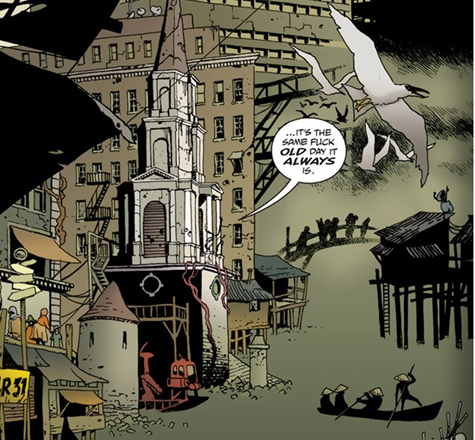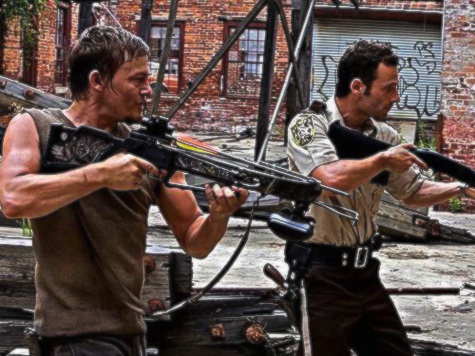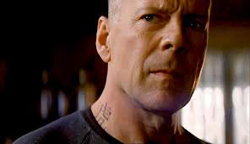The past isn’t what it used to be, because nothing stays down anymore. The drab decline of 1970s dystopias—all whimper and no bang—has had a fruitful flashback in recent years, especially this one, as the idea of the future bleeding out rather than blowing up has hit home again in the dry-up of our economy and the dribble of our winding-down military diversions.
Looper has the look of Soylent Green’s vandalized, neglected New York (an extrapolation that was all too believable at the time that film was released), and the glaring, smudged outdoor cinematography and plastic gameshow glitz of the Hunger Games movie harkened back to the deep grimness and cheap gleam of the ’70s end-of-the-world as well.

Life goes on, and that’s the true cosmic punchline; you don’t have a clean season finale or get tragically cut short – real existence tragically hangs on, and the vigorous decay of Looper’s gunmetal cityscapes and bleak farm vistas, or the lyrical squalor of Brian Azzarello & Eduardo Risso’s Spaceman comic from Vertigo, or the dreamlike muck and arcadian disarray of Beasts of the Southern Wild, are postcards from after the apocalypse.
We all know the world didn’t end in the ’70s, its own economic collapse and environmental perils and nuclear cliff’s-edge notwithstanding. Or, more accurately, that world did, but much of what it foresaw replaced it in a good way – like global, portable communication and computing, which helps topple dictatorships even as it gives them a tool they were always looking for. There’s always that tension between paths we take in what can be used for improvement or injury, and from that narrow edge there’s always something for us to fall out on, though fall we will.
In Looper the mob seems to run what’s left of America, though we have time travel, yay, and in Spaceman we’ve made it to Mars and engineered gravity-resilient superhumans for it, whee, who populate a world submerged in rancid polar-melt tides and social decomposition. There’s the potential for using these things to accomplish what we couldn’t before, though, and both stories pivot on characters’ ability to choose what does least harm and maybe even opens a path to what heals.

That’s a triumph of conscience over the mechanical, and in Beasts’ utopian post-industrial community we see the victory of the organic over the manufactured; the future is fertile but technological advancement is jettisoned, maybe has to be.
Dream visions figure prominently in Beasts, and the dead tend to the living daily in our own real world – on hundreds of cable bands and vid sites, no scrap of pop culture or current-events footage ever goes away, and this archive washes up on the present like a gray tide of discarded goods. That’s the global-junkyard look of Looper and Spaceman, and the wasteland milieu of The Walking Dead.

Not uncoincidentally one of the most phenomenal hits on TV in recent years, Walking Dead, like so many zombie dramas, tracks this free-floating cloud of yesterday that won’t sink or dissipate. But we get used to anything, and incorporate it into a bigger picture. The more you know, the more you can do. And volume tends to increase capacity, not crowd it – access to 1915 on YouTube is great for perspective and perceived options. Some worlds deserve to end, and some give their lives for new ones. The bitter, redemptive implication of the neo dystopias is that we might as well find a way to go forward. Because the world itself is not going anywhere.
Adam McGovern’s dad taught comics to college classes and served as a project manager in the U.S. government’s UFO-investigating operation in the 1950s; the rest is made up. There is material proof, however, that Adam has written comicbooks for Image (The Next issue Project), Trip City.com, the acclaimed indie broadsheet POOD, and GG Studios, and blogs regularly at HiLoBrow.com and ComicCritique. He lectures on pop culture in forums like The NY Comics & Picture-story Symposium and interviewed time-traveling author Glen Gold at the back of his novel Sunnyside (and at this link). Adam proofreads graphic novels for First Second, has official dabblings in produced plays, recorded songs and published poetry, and is available for commitment ceremonies and intergalactic resistance movements. His future self will be back to correct egregious typos and word substitutions in this bio any minute now. And then he’ll kill Hitler, he promises.










